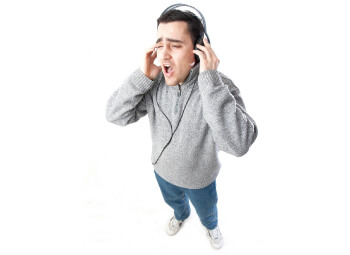Listen up, ok? Almost ten years ago at my mother’s house in lovely Charlotte, N. C., I awoke, flopped over and made an unwanted discovery. I whispered to my partner, “I can hear the clock ticking in my right year, but not in my left.” I was horrified.
Audiology diagnostics revealed I’d lost 20% of my left ear hearing. I have continued to lose sound, and my right ear is also slightly compromised. I can’t hear conversations 15 to 20 feet away and am constantly asking, “What did you say?”
Reason: I was a radio deejay for nearly a decade and I wore headphones while the music rocked on. I had two “accidents” at a station in San Antonio, during which I pushed a button and the sound blasted me so hard, I actually fell backwards, as if I’d heard an explosion. It hurt. But now the permanent damage hurts worse in my baby boomer prime.
“I want you back”

When I saw this study from Johns Hopkins, I had to share it. Nearly a fifth of us Americans 12+ may find communication difficult because of hearing loss: That’s more than anyone previously thought. Researchers found about 30 million Americans, or almost 13 percent of us, had hearing loss in both ears. For both ears, that number jumps to about 48 million, or approximately 20 percent for those who’ve lost hearing in at least one ear.
In the study, hearing loss almost doubled with every age decade: With myself an exception, women and blacks were less likely to lose hearing. Researchers think that estrogen, as well as melanin pigment in darker skin, may protect the inner ear: Wonder how this will play out in the ongoing discussions about hormone replacement therapy?
What causes hearing loss
Mayo Clinic lists these factors that can result in hearing loss. Many are no surprise to us baby boomers, including the first one:
- Aging. Lifelong exposure can damage inner ear cells. (That applies to my hearing loss.)
- Heredity.
- Occupational noises. Regular, loud noise is bad for you.
- Recreational noises. Firearms, fireworks, snowmobiling, motorcycling or—the main baby boomer culprit—listening to loud music. (We did that, yes?) Warning: Do not turn up your music headphones to obliterate other sounds: dangerous.
- Some medications and chemotherapy drugs.
- Some illnesses that produce high fever, like meningitis.
Decipher decibels:
Just so you know, here are typical decibel ratings. If you’re around loud noise, cover your ears, insert earplugs or run away!
Safe range
- 30: whisper
- 60: normal conversation
Risk range
- 85 – 90: heavy city traffic, hair dryer
- 110: rock concert
Once your hearing’s gone, well…You know the rest. Take care.
+++++++++++++++++++++++++++++++++++++++++++++++++++++++++++++++++++++
(Photo courtesy: © Antti Karppinen | Dreamstime.com)